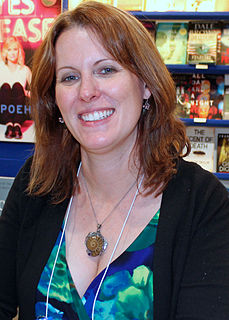A Quote by Sean Hepburn Ferrer
When I had to go to school and could no longer travel to be with her on the set, she gave up her career. She felt the most valuable thing was family.
Related Quotes
[Keeping kosher was] the symbol of an initiation, like the insignia of a secret brotherhood, that set her apart and gave her freedom and dignity. Every law whose yoke she accepted willingly seemed to add to her freedom: she herself had chosen . . . To enter that brotherhood. Her Judaism was no longer a stigma, a meaningless accident of birth from which she could escape . . . It had become a distinction, the essence of her self-hood, what she was, what she wanted to be, not merely what she happened to be.
As she had been walking from the ward to that room, she had felt such pure hatred that now she had no more rancor left in her heart. She had finally allowed her negative feelings to surface, feelings that had been repressed for years in her soul. She had actually FELT them, and they were no longer necessary, they could leave.
Sharp knives seemed to cut her delicate feet, yet she hardly felt them, so deep was the pain in her heart. She could not forget that this was the last night she would ever see the one for whom she had left her home and family, had given up her beautiful voice, and had day by day endured unending torment, of which he knew nothing at all. An eternal night awaited her.
In this moment she felt that she had been robbed of an enormous number of valuable things, whether material or intangible: things lost or broken by her own fault, things she had forgotten and left in houses when she moved: books borrowed from her and not returned, journeys she had planned and had not made, words she had waited to hear spoken to her and had not heard, and the words she meant to answer with. . . .
At that moment a very good thing was happening to her. Four good things had happened to her, in fact, since she came to Misselthwaite Manor. She had felt as if she had understood a robin and that he had understood her; she had run in the wind until her blood had grown warm; she had been healthily hungry for the first time in her life; and she had found out what it was to be sorry for someone.
My mother didn't feel sorry for herself, she was left with no child support, no alimony at a very young age, with a child to raise, a high school education and she just figured it out. She didn't complain, she didn't rely upon government, she relied upon her own skill set, her own self confidence, her own drive in moxie and her own duty to me and her and she relied upon her family and her faith.
She stared at herself in the mirror. Her eyes were dark, almost black, filled with pain. She'd let someone do that to her. She'd known all along she felt things too deeply. She became attached. She didn't want a lover who could walk away from her, because she could never do that - love someone completely and survive intact if her left her.
She writes that one of the moments that she felt most useful was when her mother had a headache, and she would stroke her head and rub her forehead. And I think Eleanor Roosevelt's entire life was dedicated to two things: (one) making it better for all people, people in trouble and in need, like her family.
The words burned on her tongue, but Minerva couldn’t give them voice. What a hopeless coward she was. She could pound on his door at midnight and demand to be respected as an individual. She could travel across the country in hopes of being appreciated for her scholarly achievements. But she still lacked the courage to ask for the one thing she wanted most. To be loved, just for herself.
She imagined herself both queen and slave, dominatrix and victim. In her imagination she was making love with men of all skin colors--white, black, yellow--with homosexuals and beggars. She was anyone's, and anyone could do anything to her. She had one, two, three orgasms, one after another. She imagined everything she had never imagined before, and she gave herself to all that was most base and most pure.































